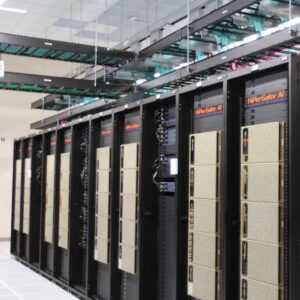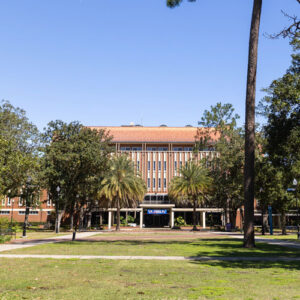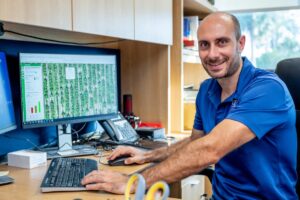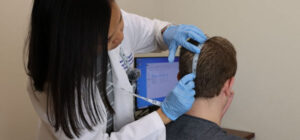Author: Sara Dwyer

Drones, AI help farmers save money, protect the environment
June 2, 2025Researchers at the UF/IFAS Tropical Research and Education Center (TREC) in Homestead used drone-based imaging to help determine how much nitrogen fertilizer hemp plants need for optimal growth and flower […]

The fourth-gen model of UF’s HiPerGator is built to reshape AI education and research
June 2, 2025UF is set to introduce the long-awaited, upgraded, fourth-generation version of the supercomputer HiPerGator. Half of the system with the new technology — the first of its kind in higher […]

UF and other research universities will fuel AI. Here’s why
May 7, 2025The next major advancements in AI will come from research universities across the nation, not Silicon Valley. With renewable data and powerful supercomputers, institutions like the University of Florida are […]

University of Florida students build high-tech prowess for the workforce
May 7, 2025Free access to HiPerGator is giving UF students a major leg up among their peers when it comes to conducting groundbreaking research. Due to a collaboration called the Library HiPerGator […]

From problem to on-farm solution: The journey of one UF/IFAS AI technology
February 26, 2025Hurricane Irma served as a turning point for UF’s Yiannis Ampatzidis, highlighting the urgent need to find innovative solutions to address challenges in agriculture.

One AI-based advancement at a time, UF leaders are transforming the sports industry
February 26, 2025As emerging technologies like AI reshape sport industries and professional demands evolve, it is essential for students to graduate with the expertise to thrive in their future careers. To ensure that these students are set up for success, the UF College of Health & Human Performance has launched a new sports analytics program.

AI technology uses less herbicide to kill weeds
February 26, 2025Vegetable growers use herbicides to kill weeds to prevent crop loss. Meanwhile, a UF researcher is using AI to reduce herbicide sprayed on crops. The researcher developed and evaluated a precision-spraying system designed to make sure herbicide goes through the holes that scientists punch in the plastic mulch and into the soil where tomatoes are growing.

Think you can cheat with AI? A UF professor creates watermarks to detect AI-generated writing
February 26, 2025AI is putting instructors and employers in an awkward position when it comes to accepting written work, leaving them wondering: Who wrote this? A human or AI? A UF engineering professor is developing a digital watermark that could remove the guesswork and actually flag AI-generated text when someone submits their writing.

The University of Florida’s ‘AI Queen’ is using AI technology to help prevent dementia
February 26, 2025Aprinda Indahlastari Queen, Ph.D., is applying AI technology to study transcranial direct current stimulation, or tDCS — a technique that involves placing electrodes on the scalp to deliver a weak electrical current to the brain — as a possible way to prevent dementia.
